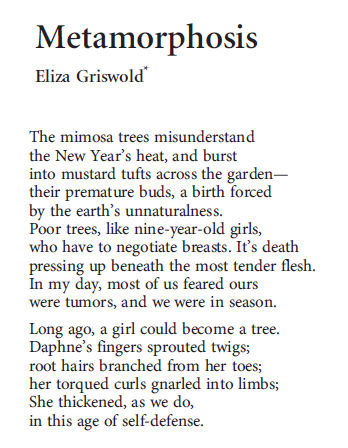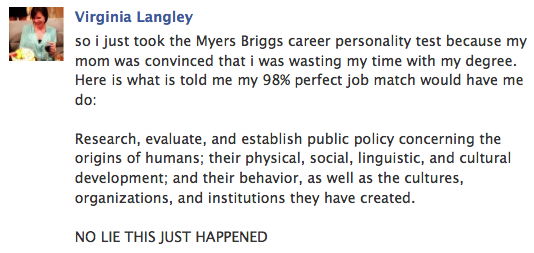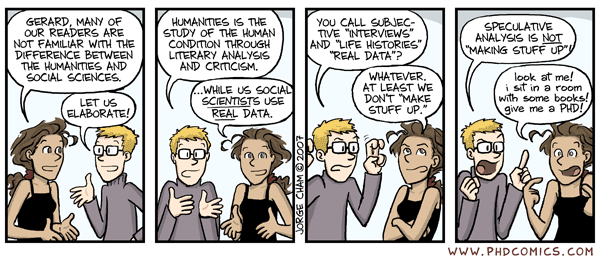Welcome to WordPress. This is your first post. Edit or delete it, then start blogging!
“And That’s Why No One Takes The Humanities Seriously”
In the second of its four issues in 2011, the widest circulating journal in the academic study of religion–the Journal of the American Academy of Religion (JAAR)–began opening each issue with a poem.
 Continue reading ““And That’s Why No One Takes The Humanities Seriously””
Continue reading ““And That’s Why No One Takes The Humanities Seriously””
I Wonder What Caitlin Makes?
Last summer, Kiplinger–of the “Timely, Trusted Personal Financial Advice” fame–published a list of the worst college majors for your career. Guess what made the number four spot on the top ten list?
Yes, Virginia…
One of our majors (also minoring in Judaic Studies) posted the following on our student association’s Facebook page earlier today (re-posted here with her permission):
Leaving aside, for the time being, the issue of whether personality, aptitude, and IQ tests actually tell us anything concrete about individuals (as opposed either to generalized conclusions about wide groups or the assumptions and values of those who make the tests), we can at least say that, yes, Virginia, there is a major like that. And yes, mom, there are wonderful careers for people who possess these skills.
Stars Upon Thars
“This so-called real world is the same place we’ve always been, of course….”
So said Greg Johnson, in the close to his public lecture the other day (read the conclusion to his paper here). This is an exceedingly important point, I think; the university as a whole, and of course the Humanities in particular, are often accused of being disengaged from this real world; the privileged, “ivory tower” (a phrase we get from the Song of Solomon–hardly a working class text itself, but I digress) that we in the university inhabit is thought somehow to be secluded, and thereby protected, from the rest of the world. This otherworldly realm of merely immaterial ideas (as it is characterized) is therefore something apart from the material world of matters that matter. Continue reading “Stars Upon Thars”
Greg Johnson on the Real World in Real Time
On November 6, 2012, the second lecture in the 2012-13 series was presented by Prof. Greg Johnson, Chair of the Department of Religious Studies at the University of Colorado, Boulder. His lecture–entitled, “In the Moment: The Relevance of the Humanities and Social Sciences for the Study of Religion in Real Time”–opened by reflecting on the “Studying Religion in Culture” motto of UA’s Department of Religious Studies and then moved on to examining the manner in which ongoing debates and legal contests in Hawaii over contemporary indigenous people’s rights and ancestral remains present the scholar of religion with an opportunity to study religion both in the skin and in the bone, as he phrased it, i.e., examining, “in real time,” the manner in which it is performed/enacted both in more flamboyant, public settings (e.g., organized protests) and also in a more behind-the-scenes, structural manner (e.g., people attending hearings and meetings, taking minutes, filing legal briefs and court challenges, etc., all in the context of operationalizing the federal Native American Graves Protection and Repatriation Act of 1990).
After examining two case studies from Hawaii he turned his concluding attention toward linking his approach to studying religion, politics, and identity, toward the theme of this year’s lecture series. Prof. Johnson kindly provided his unpublished text to the Department and so the conclusion in posted below. Continue reading “Greg Johnson on the Real World in Real Time”
Where’s Waldo?
This morning, a friend on Facebook used wordle.com to create a tag cloud for the online program book of the upcoming annual meeting of the American Academy of Religion (AAR)–the largest professional association for scholars of religion. Another version is posted here.
 It’s hardly a scientific or systematic representation of what scholars of religion work on, and I’d hate to draw too many conclusions about the field simply from the frequency of certain words’ appearances in panel titles, paper titles, and abstracts for papers. (E.g., “University” is so large surely because it appears in almost every presenter’s institutional affiliation, which appears with every paper in the program book.) However, noticing how tiny the word “theory” is (I leave it to you to find that particular Waldo), it prompted me to wonder what a tag cloud for a truly social scientific conference on religion might look like–one that studied people rather than the claims they make. That is, would we find “experience,” “theology,” “Christian,” and “God” so prominent, and “history,” “human,” “people,” “culture,” and “order” so small…?
It’s hardly a scientific or systematic representation of what scholars of religion work on, and I’d hate to draw too many conclusions about the field simply from the frequency of certain words’ appearances in panel titles, paper titles, and abstracts for papers. (E.g., “University” is so large surely because it appears in almost every presenter’s institutional affiliation, which appears with every paper in the program book.) However, noticing how tiny the word “theory” is (I leave it to you to find that particular Waldo), it prompted me to wonder what a tag cloud for a truly social scientific conference on religion might look like–one that studied people rather than the claims they make. That is, would we find “experience,” “theology,” “Christian,” and “God” so prominent, and “history,” “human,” “people,” “culture,” and “order” so small…?
Search the online program book for yourself–type in some interesting key words and see what you come up with.
The Pleasure of Finding Things Out
Those familiar with the online comic, PhD Comics may be familiar with the following strip (originally posted on September 3, 2007):
I’m Rubber, You’re Glue
Definitions of the Humanities are themselves a curious thing, inasmuch as they often raise more issues than they settle. For example, consider this definition as found on the website for the US’s main Federal funding source for research in this area, the National Endowment for the Humanities:
 Continue reading “I’m Rubber, You’re Glue”
Continue reading “I’m Rubber, You’re Glue”
“You Just Watch Me!”
My undergraduate degree was in what my university (Queen’s University) called Life Sciences–what others might have once called pre-med. Many of us wrote the MCAT (as I did) but not all of us got into medicine (as I didn’t, but as my roommate did). In our first year, we predictably took courses in Chemistry, Biology, Physics (each of which had its own three hour lab too, of course), Calculus, and Psychology–the last being an elective but everyone pretty much took it. In other years we enrolled in such courses as Organic Chemistry, Genetics, Biochemistry, Histology, Abnormal Psych, Anatomy, Statistics, Brain and Behavior, Physiology, etc. I would imagine that many of my classmates who, like the vast majority of us, didn’t get into medicine, have ended up in one of the many adjacent fields–such as going on to do a Master of Science degree in Microbiology (“micro” for the initiated), or eventually going into, say, Pharmacology–either to do research, work for a drug company’s marketing division (as one friend did after getting his Ph.D.), or owning your own pharmacy (the route taken by another good friend from my Life Sciences days). Continue reading ““You Just Watch Me!””



